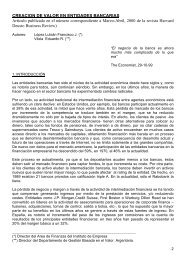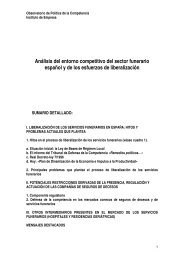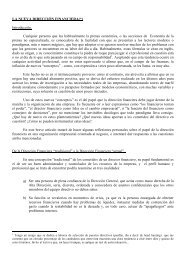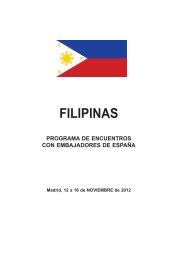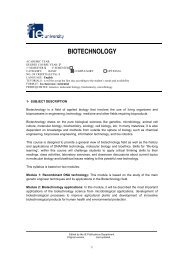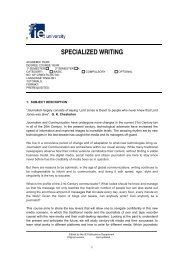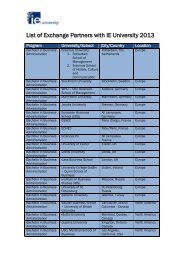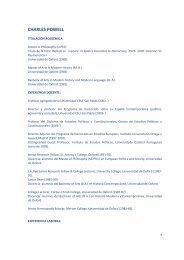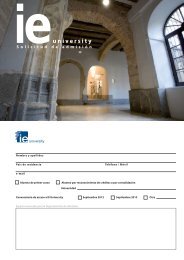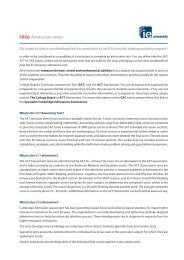FOOD ANALYSIS - IE
FOOD ANALYSIS - IE
FOOD ANALYSIS - IE
You also want an ePaper? Increase the reach of your titles
YUMPU automatically turns print PDFs into web optimized ePapers that Google loves.
<strong>FOOD</strong> <strong>ANALYSIS</strong><br />
ACADEMIC YEAR:<br />
DEGREE COURSE YEAR: BACHELOR IN BIOLOGY<br />
1º SEMESTER 2º SEMESTER<br />
CATEGORY: BASIC COMPULSORY OPTIONAL<br />
NO. OF CREDITS (ECTS): 3<br />
LANGUAGE: ENGLISH<br />
TUTORIALS: TO BE ARRANGED WITH THE STUDENTS AT THE BEGINNING OF THE COURSE<br />
FORMAT: ON SITE<br />
PREREQUISITES: CHEMISTRY IN BIOLOGICAL PROCESSES, BIOCHEMISTRY, QUALITY<br />
MANAGEMENT OF BIOLOGICAL PRODUCTS<br />
1- SUBJECT DESCRIPTION<br />
Food analysis is the science that covers the development, use and study of the analytical<br />
procedures required for the evaluation of food composition and characteristics. The results of<br />
these analyses are critical to ensure the quality and safety of the food supply. All food products<br />
require analysis as part of a quality management program during the development process,<br />
through production, and after the product is in the market. In addition, analysis is done of<br />
problem samples and competitor products.<br />
This subject will review the basic principles of the most common procedures employed for food<br />
analysis. The course will cover compositional analysis of food nutrients. In addition conferences<br />
with experts in the field and laboratory practices will be done.<br />
One of the multiple fields where biologists may exert their professional career is the food<br />
industry area, performing tasks such as quality control analysis, risk analysis, research and<br />
development, marketing, etc. Through the study of this subject the students will have a general<br />
idea of the main analytical techniques applied in food quality control as well as being able to<br />
identify the specific analysis required for each type of food. This knowledge is essential in order<br />
to qualify future biologists to work on the food industry.<br />
2- OBJECTIVES AND SKILLS<br />
• Integrate the knowledge learnt in other subjects such as biochemistry and relate it with<br />
the food analysis.<br />
• Understand the importance of food analysis for the consumer and the food industry.<br />
• Understand how to analyze the principal components on a food system, starting from an<br />
adequate sampling procedure.<br />
• Learn how to select the most appropriate method of analysis depending on the food and<br />
on the component to be analyzed.<br />
• Development of laboratory skills to the analytical techniques best use.<br />
• Development of reading, searching and selecting criteria in order to get information<br />
useful for the study and the deepening of the subject.<br />
Edited by the <strong>IE</strong> Publications Department.<br />
Original version, . Last updated, .<br />
1⏐
3- CONTENT<br />
MODULE I: COMPOSITIONAL <strong>ANALYSIS</strong> OF <strong>FOOD</strong> (THEORY)<br />
LESSON 1: Introduction to food analysis and sample preparation. (Session 1)<br />
Contents:<br />
- Introduction. Steps in food analysis. Choice and validity of method. Official Methods.<br />
Sampling procedures. Preparation of samples.<br />
Competencies:<br />
- Understand the importance of food analysis for the food industry and the human wellbeing.<br />
- Comprehend the importance of sample preparation in obtaining reliable and accurate<br />
analysis results<br />
LESSON 2: Moisture analysis (Session 2-3)<br />
Contents:<br />
- Importance of moisture assay. Forms of water in food. Sample collection. Oven drying<br />
methods. Distillation procedures. Chemical methods. Physical methods. Water activity<br />
Competencies:<br />
- Understand the importance of moisture analysis for the food industry and learn the<br />
basic methodological principles for its evaluation<br />
LESSON 3: Fat analysis (Session 4-7)<br />
Contents:<br />
- Introduction. Solvent extraction methods. Nonsolvent wet extraction methods. Instrumental<br />
methods<br />
Competencies:<br />
- Understand the importance of fats analysis for the food industry and learn the basic<br />
methodological principles for their evaluation<br />
LESSON 4: Protein analysis (Session 9-10)<br />
Contents:<br />
- Introduction. Kjeldahl method. Dumas method. Infrared Spectroscopy. Biuret method.<br />
Lowry method. Dye-Binding methods. Bicinchoninic acid method. Ultraviolet Absorption<br />
method.<br />
Competencies:<br />
- Understand the importance of proteins analysis for the food industry and learn the basic<br />
methodological principles for their evaluation<br />
LESSON 5: Carbohydrate analysis ((Session 11-12)<br />
Contents:<br />
- Introduction. Mono and oligosaccharides analysis. Polysaccharides analysis. Dietary fiber<br />
analysis. Physical methods<br />
Competencies:<br />
- Understand the importance of carbohydrates analysis for the food industry and learn the<br />
basic methodological principles for their evaluation<br />
2⏐
LECTURES BY EXPERTS IN THE F<strong>IE</strong>LD (THEORY)<br />
Lecture 1: Advanced analytical techniques for food analysis (session 8)<br />
Lecture 2: Instrumental and sensory analysis of food aroma compounds: relationship with<br />
food quality. (session 13)<br />
LABORATORY PRACTICE<br />
Fish Muscle proteins: extraction and quantification (Sessions 5-6). The use of lab coat is<br />
mandatory.<br />
Presentation of assignments and Final exam (Sessions 14 and 15)<br />
4- METHODOLOGY AND ECTS WEIGHTING<br />
The methodology of the subject will be sustained in four pillars:<br />
4.1. Lectures: they will expose the principal concepts to be acquired by the student in order<br />
to have a general view of the subject. To achieve that, power point presentations will be the<br />
main tool. All the presentations will be given to the student once the lesson is finished. The<br />
classes will be interactive with the students, always trying to create a fruitful discussion<br />
4.2. Seminars by experts: scientific experts from the field will explain advanced concepts<br />
related with the subject. The aim of these seminars is to give the students a more detailed<br />
and complex view of the subject. All the concepts acquired during the seminars will be also<br />
evaluated in the final exam.<br />
4.3. Laboratory practices: to give a real view of at least one of the techniques learnt during<br />
the lectures. After the practice the students will have to deliver a report with the results<br />
obtained<br />
4.4. Personal assignment: the student will have to elaborate a personal assignment<br />
covering one of the aspects of the subject not covered during the lessons. Each assignment<br />
will be distributed between the classmates so they can have similar access to the<br />
information. These assignments will be also included in the final exam.<br />
*** Computers are not required and are not allowed in the classroom<br />
On site activity Hours Personal work Hours ECTS credits<br />
Class lectures 13.5 Study 35.0 1.94<br />
Seminars by experts 3.0 Assignment preparation 15.0 0.72<br />
Laboratory practices 3.0 Laboratory notebook 2.5 0.22<br />
Personal Assignment 1.5 0.06<br />
Exam 1.5 0.06<br />
TOTAL 22.5 52.5 3.0<br />
5- EVALUATION SYSTEM<br />
5.1. GENERAL OBSERVATIONS<br />
The participation in the different activities is compulsory for the final evaluation of the<br />
subject. Attendance will be compulsory in the % stipulated by the University.<br />
The academic performance of the students and their final mark in the subject will be<br />
evaluated according to the criteria summarized in the following lines.<br />
3⏐
5.2. EVALUATION AND WEIGHTING CRITERIA<br />
Final Written Examination: 40%: A final exam covering all the aspects discussed during<br />
the different sessions will be done at the end of the subject. This exam will consist in short<br />
questions related with the theory lessons, lectures, personal assignments and laboratory<br />
practice done thorough the course. It is necessary to answer correctly more than 40% of the<br />
questions in order to pass the subject.<br />
Personal assignment: 40%: Each student will have to elaborate a personal assignment<br />
regarding an aspect of the subject. From the 40%, a 10% will correspond to the assignment<br />
oral presentation. Assignments topics and submission date will be fixed on the first day of<br />
class so each student may choose the topic to his best. A delay in the assignment<br />
submission will have a penalty of a 10% for each day of delay being the maximum 72 hours.<br />
Laboratory practices: 10%: The attitude and involvement of each student during the<br />
laboratory practices will be regarded. Also a laboratory notebook will be asked from each<br />
student with the main results of the practice. Laboratory notebooks will be taken the day of<br />
the exam.<br />
Attitude: 10%. Attendance and active participation of the students as well as the interest of<br />
the student will be evaluated positively for the final punctuation.<br />
Grading notation: A quantitative estimate of the grades for each student will be reported<br />
on a 1 to 10 scale being the 10 the maximum grade attainable.<br />
Notes:<br />
• Students not attending at the 70% of the classes will lose their rights for the<br />
evaluation of the subject, obtaining a 0 score on the first and extraordinary calls for<br />
examination. Only justified absences will be considered.<br />
• Laboratory sessions are mandatory. If the student does not assist due to a justified<br />
cause, he/she will have to do an extra activity related with the lost part according to<br />
the teacher criteria.<br />
• Students not passing the subject on the first call for examination must take an<br />
extraordinary exam covering the entire subject. Similarly to the ordinary exam, the<br />
extraordinary exam will consist in short questions related with the theory lessons,<br />
lectures, personal assignments and laboratory practice done thorough the course.<br />
The extraordinary exam will be the only evaluation criteria (100% of the grade) and<br />
the maximum grade obtained will be 8 over 10.<br />
• A bad attitude during the sessions will be considered negatively by the teacher and<br />
may reduce the final mark in a considerably manner.<br />
4⏐


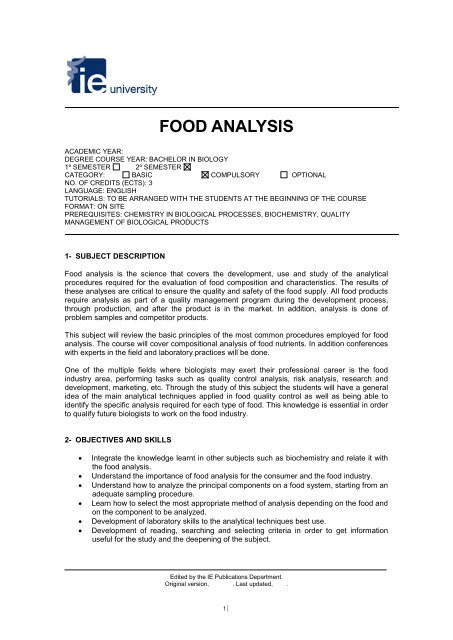
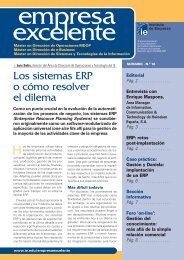
![Change Management Workshop Program Brochure[pdf] - IE](https://img.yumpu.com/22502183/1/184x260/change-management-workshop-program-brochurepdf-ie.jpg?quality=85)
